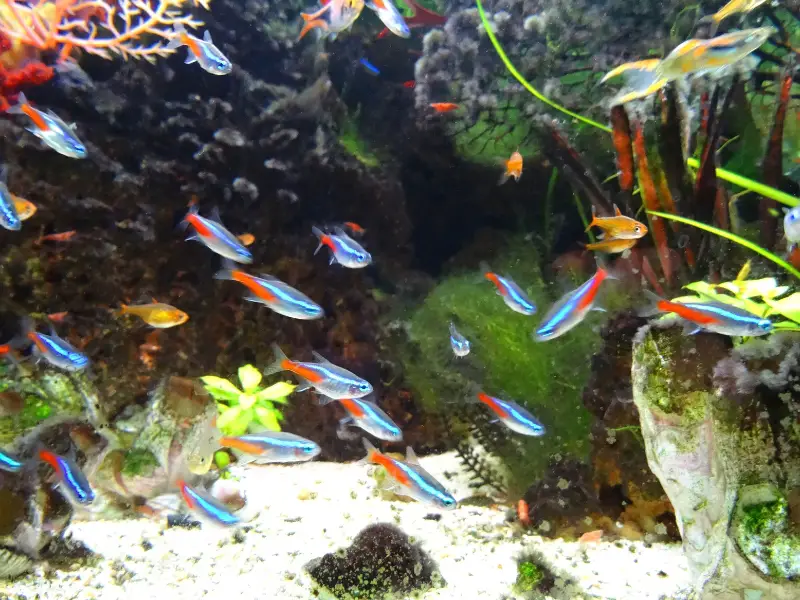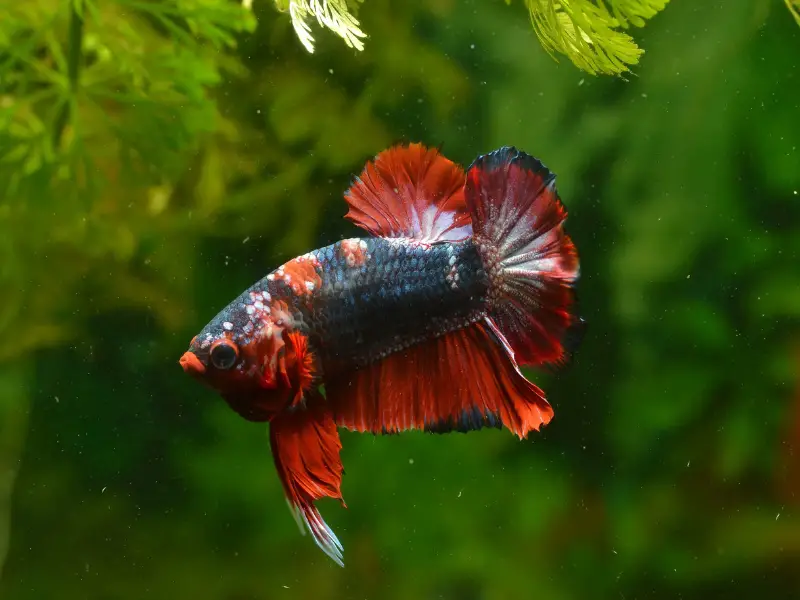Can guppies live with bettas? It’s essential to understand the compatibility of these fish species, as well as their unique needs, to create a harmonious environment.
Guppies and bettas have similar water parameters and care needs, making them potentially suitable tank mates.
However, it’s essential to consider some factors before introducing them to shared space.
In this article, we will tell you everything you need to know about keeping guppies and bettas together.
Can Guppies Live with Bettas?
Yes, guppies and bettas can live together, but certain conditions should be met.
One important factor is the betta’s aggression and temperament.
You should opt for less aggressive betta fish like half-moon or delta bettas, and consider female bettas as they tend to be less hostile.
Male guppies can sometimes have flashy fins resembling betta fish, which might trigger aggression from male bettas.
Keeping guppies with plain fins could help reduce potential conflict.
Ensuring a spacious tank with hiding spots for your guppies can also reduce stress and minimize the chances of aggression.
Closely monitor the interaction between your guppies and betta fish, and separate them if required.
Factors to Consider when Keeping Guppies and Bettas Together

Keeping guppies and bettas together can be challenging, as both species have different requirements and temperaments.
Here are some factors to consider when keeping guppies and bettas together:
Tank Size
When keeping guppies and bettas together, you need to ensure that your tank is large enough to accommodate both species comfortably.
A minimum tank size of 10 gallons is recommended, as it provides ample space for swimming and establishing territories.
Additionally, a larger tank may help reduce the likelihood of aggression between the fish.
Water Temperature & pH
Both guppies and bettas require similar water conditions for optimal health.
Maintain a water temperature between 76-82°F (24-28°C) and a pH level of 6.5-7.5.
Consistency in water parameters is essential, so be sure to monitor the temperature and pH levels regularly.
Temperament
The temperament of your fish is a significant factor to consider when keeping guppies and bettas together.
In general, bettas can be aggressive, while guppies are peaceful and social.
To minimize the risk of aggression, select betta breeds that are less aggressive, such as the half-moon or delta betta.
Additionally, monitor your fish closely for any signs of stress or aggression, and be prepared to separate them if necessary.
Age
The age of your fish is another factor to consider.
Introducing guppies and bettas into the tank when they are young may increase the chances of them getting along.
This is because they would not have developed territorial behaviors yet, and they can grow up together in the same environment, learning to coexist peacefully.
Fin Length & Appearance
Guppies, especially males, have brightly colored fins that may trigger aggressive behavior in bettas.
To minimize this risk, choose guppies with shorter or less flashy fins and avoid housing male guppies with male bettas.
The best option for this type of community tank is female guppies with a female betta.
By considering these factors, you can take the necessary steps to provide a safe and comfortable environment for your guppies and bettas to live together.
How to Keep Guppies and Bettas in the Same Tank?
With proper planning and care, guppies and bettas can live in the same tank. Here are some tips on how to keep guppies and bettas together:
Choose the Right Fish
Before adding guppies and bettas to a tank, ensure that you select fish with compatible temperaments.
For bettas, choose those with a calmer demeanor, which are less aggressive towards colorful, small fish, like guppies.
For guppies, opt for those without large, flowing fins, as they might trigger the betta’s aggression.
Set Up the Tank
Properly setting up the tank is crucial to providing a comfortable environment for both species.
Provide a spacious tank, like this one sold on Amazon, that allows them to have their separate territories.
Incorporate plants and decorations to create hiding spots, and maintain suitable water quality with proper filtration and heating.
Both guppies and bettas prefer slightly acidic water with a pH between 6 and 7.5 and a temperature range of 76°F to 82°F.
Add Fish to the Tank
When introducing guppies and bettas to a tank, do so gradually.
First, add the guppies and give them time to settle. Observing their behavior will help you identify any compatibility issues early on.
Once the guppies have acclimated, slowly introduce the betta, ensuring the fish have enough distance between them to minimize conflicts during the adjustment period.
Monitor the Fish
Keep an eye on your fish, especially during the initial stages of their cohabitation.
Pay close attention to their behavior and look for signs of aggression or stress.
Separate the fish if necessary, or make adjustments to the tank to improve their living conditions.
Regularly monitoring the fish will ensure a more harmonious and successful tank setup.
Tips for Keeping Bettas and Guppies in the Same Aquarium

Here are several tips for keeping bettas and guppies happy in the same tank:
1. Give Them Time to Adjust
Introduce your betta and guppies to their shared tank gradually.
Start by placing them in separate containers within the aquarium, allowing them to observe each other without direct contact.
This gives them time to become familiar with their new tank mates, which can help reduce possible aggression later on.
2. Add More Guppies
Having a higher number of guppies in the tank can help diffuse the attention of the betta, making it less likely to target a single guppy.
Try to maintain a 3-to-1 ratio of guppies to betta, ensuring that the guppies can enjoy the safety in numbers, while not overcrowding the tank.
3. Change Water Regularly
Maintaining a clean environment is crucial to the health of your fish.
Change at least 25% of the water every week, ensuring fresh, clean water for your betta and guppies.
This also helps to prevent the buildup of harmful compounds in the water which can cause stress or illness in your fish.
4. Provide Enough Hiding Places
Adding an assortment of hiding spots, such as plants, caves, like this one, and decorations, can reduce stress levels in both bettas and guppies.
This provides them with a sense of security and territory in their shared environment, allowing them to explore and rest without feeling threatened.
5. Get a Bigger Tank
For a harmonious coexistence between bettas and guppies, it’s vital to have enough space for all inhabitants.
A 10-gallon tank, or bigger is recommended, allowing ample room for swimming and ensuring that the betta doesn’t feel the need to defend a smaller territory, which can lead to potential conflicts with the guppies.
Additionally, a larger tank makes it possible to maintain water quality more effectively.
FAQs About Can Guppies Live with Bettas
Do Bettas and Guppies Get Along?
Bettas and guppies can coexist in the same tank, but it can be challenging.
Bettas are known for their aggressive behavior, especially towards fish with long, flowing fins like guppies. Guppies are peaceful fish that prefer to swim in schools.
If kept together, it’s important to provide a suitable tank with plenty of hiding places and decorations to reduce stress and provide places for the fish to retreat.
Additionally, it’s important to monitor the fish for any signs of aggression or stress and be prepared to separate them if necessary.
What Fish Cannot Go with a Betta?
Certain fish species are not suitable as tank mates for bettas.
Avoid keeping aggressive or fin-nipping fish with bettas, as they may trigger violent behavior or stress.
Examples of fish to avoid include tiger barbs, Serpae tetras, red-tail sharks, African cichlids, and other betta fish.
When selecting tank mates for your betta, choose peaceful and non-aggressive species that thrive in similar water conditions.
What Size Tank Do Betta Fish Need with Guppies?
When keeping betta fish with guppies, it’s important to provide a tank that is large enough to accommodate both species and provide adequate swimming space.
A minimum tank size of 20 gallons is recommended to provide enough space for both species.
This allows for ample swimming space and provides enough room for decorations, plants, and hiding places.
Additionally, a larger tank can help reduce aggression between the fish and provide more stable water conditions.
It’s important to maintain good water quality and provide plenty of hiding places and decorations to help reduce stress and promote the health of your betta and guppies.
What Fish Cannot Live with Guppies?
There are some fish that may not be compatible with guppies due to differences in temperament, feeding habits, and water requirements.
Aggressive fish such as cichlids and some species of barbs may attack or bully guppies.
Fin nippers such as tiger barbs and some tetras can nip at the fins of other fish, including guppies.
Large predatory fish such as Oscars and Arowanas may view guppies as prey and attack or eat them.
Bottom-dwelling fish such as loaches and catfish may compete with guppies for food and may accidentally harm them.
Related Articles: